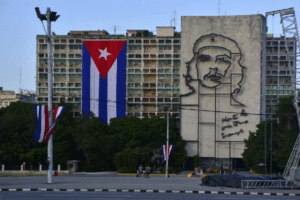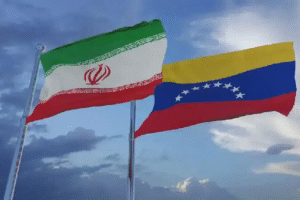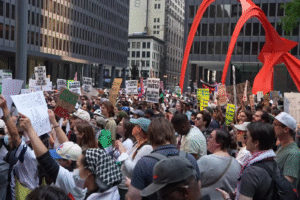By Stephen Gowans | August 23, 2013 |
The United States is once again, without evidence, accusing Syrian forces of using chemical weapons.
A senior White House official spoke of “strong indications” of “a chemical weapons attack—clearly by the (Syrian) government,” but added “we need to do our due diligence and get all the facts.” [1] In other words, we haven’t got the facts, but that won’t stand in the way of our making the accusation.
The New York Times called the accusation into question with this headline: Images of Death in Syria, but No Proof of Chemical Attack. [2]
The newspaper went on to say that according to experts, videos of the attack’s aftermath “did not prove the use of chemical weapons.” It added that,
Gwyn Winfield, editor of CBRNe World, a journal that covers unconventional weapons, said that the medics would most likely have been sickened by exposure to so many people dosed with chemical weapons—a phenomenon not seen in the videos. [3]
The Syrian military vehemently denies that it used chemical weapons. That, of course, doesn’t prove its innocence. The Syrians could be trying to cover up to avoid a backlash. But if they’re concerned about a backlash, why use the weapons at all?
It makes no sense to use gas, a weapon of mass destruction, to kill only as many people as can be killed readily with conventional weapons [4], while handing the United States, France and Britain—countries with histories of finding excuses to topple economically nationalist governments—a pretext to step up their intervention in Syria’s internal affairs.
The White House’s contention that Syrian forces are using chemical weapons but “keeping strikes small…possibly to avoid mass casualties that could spark a stronger international response” [5] doesn’t add up. It’s like accusing a country of using nuclear weapons, but keeping casualties low to avoid eliciting a punitive international response. If your objective is few casualties and no strong international response, why use weapons that produce neither?
The White House set the standard earlier this year for hurling baseless accusations in connection with Syria when it announced that it had concluded that the Syrian government had used chemical weapons, but admitted it had no proof.
On June 13, Deputy US National Security Advisor for Strategic Communications Ben Rhodes announced that: “Following a deliberative review, our intelligence community assesses that the Assad regime has used chemical weapons, including the nerve agent sarin, on a small scale against the opposition multiple times in the last year.” [6]
Further down in the statement Rhodes admitted that the evidence the United States had collected “does not tell us how or where the individuals were exposed or who was responsible for the dissemination (emphasis added).” [7]
Read that again: The White House’s evidence “does not tell us…who was responsible.”
Contrast the rush to find Damascus guilty on the basis of no evidence with the White House’s ridiculous refusal to conclude that the Egyptian military carried out a coup d’etat, despite overwhelming and conspicuous evidence it did. For Washington, it seems, facts are facts, and conclusions are conclusions, but they exist in separate, unconnected, worlds.
So why is the United States baselessly accusing the Syrian military of using chemical weapons? For the same reason it calls the Syrian government the Assad regime. Both serve to create a demon. And creating demons, as Michael Parenti has pointed out, gives you license to intervene. (8)
In a letter to a US Congressman, the United States’ top military officer, General Martin Dempsey, acknowledged that the war in Syria is fuelled by “underlying and historic ethnic, religious and tribal issues’—a substantially different, and more realistic, take on the war than the simple-minded pro-democracy-rebels-fighting- against-dictatorship twaddle favored by the manufacturers of public opinion. Dempsey went on to say that the Pentagon could intervene in Syria to tip the balance in the war, but that there are no opposition groups “ready to promote their interests and ours.” [9]
Since it’s absurd to say that there are no opposition groups ready to promote their own interests (what group doesn’t promote its own interests as its members understand them?) it can only be concluded that what Dempsey really meant was that there are no groups that see their interests as consonant with those of the United States, and until Washington can create such a group and the group has broad public support, the Pentagon will wait to intervene more forcefully.
Until then, we can expect that Washington will continue to demonize the Syrian government and its leader—even if it has to draw conclusions from thin air to do so.
1. Sam Dagher, Farnaz Fassihi, and Adam Entous, “U.S. Suspects Syria Used Gas,” The Wall Street Journal, August 21, 2013
2. Ben Hubbard and Hwaida Saad, “Images of Death in Syria, but No Proof of Chemical Attack,” The New York Times, August 21, 2013
3. Hubbard and Saad.
4. Estimates range from “scores” to 130 to over 1,000 people killed in the latest incident, depending on the source.
5. Dagher, Fassihi and Entous.
6. Statement by Deputy National Security Advisor for Strategic Communications Ben Rhodes on Syrian Chemical Weapons Use, June 13, 2013, http://www.whitehouse.gov/the-press-office/2013/06/13/statement-deputy-national-security-advisor-strategic-communications-ben-
7. Rhodes.
8. Paul Weinberg, “The Face of Imperialism: An interview with Michael Parenti”, rabble.ca, November 3, 2011,http://rabble.ca/news/2011/11/face-imperialism-interview-michael-parenti. Parenti said, “Once you convince the American public there are demons, you have the license to bomb their people.”
9. Thom Shanker, “General Says Syrian Rebels Aren’t Ready to Take Power,” The New York Times, August 21, 2013
_____
Source: Chemical Weapons, Syria, what’s left, August 22, 2013
____________________




